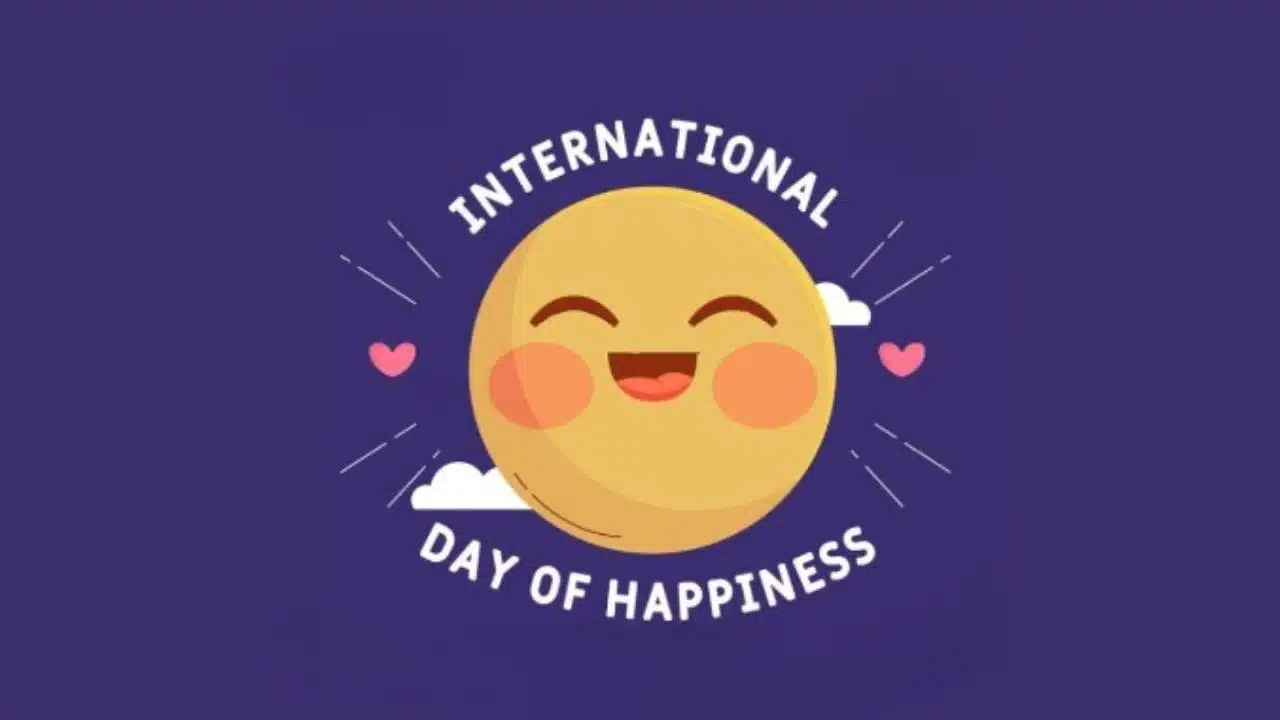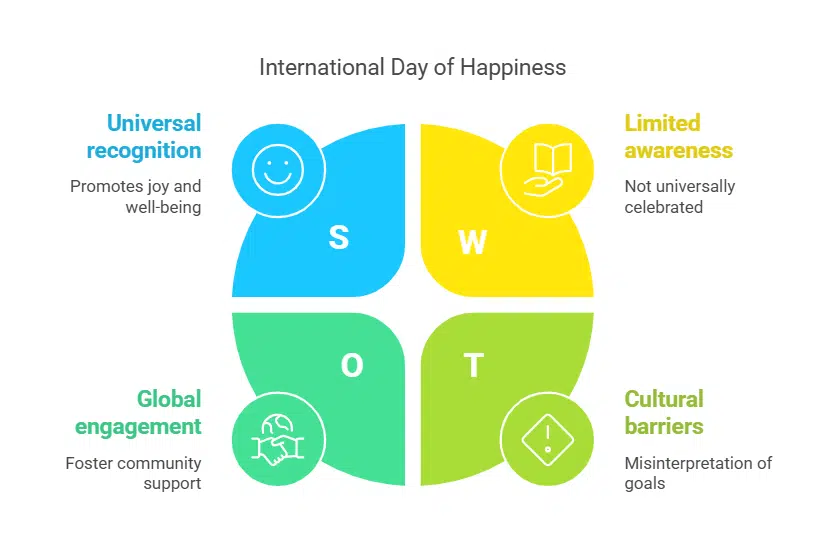The International Day of Happiness is celebrated annually on March 20 to emphasize the importance of happiness and well-being as fundamental human goals. Established by the United Nations General Assembly in 2012, this special day serves as a reminder that economic progress should not be the sole measure of success; instead, human well-being and happiness should be central to global development efforts.
Today is the International Day of happiness 2025. This observance aligns with the idea that a more inclusive, equitable, and sustainable approach to economic growth can create a happier and more balanced world.
As people across the globe observe this day, discussions, activities, and initiatives focus on the importance of happiness in individual lives, communities, and policy-making. The day also underscores the significance of mental health, social connections, and sustainable development in fostering happiness worldwide.
History and Origin of the International Day of Happiness
The International Day of Happiness was first proposed by Bhutan, a country known for prioritizing Gross National Happiness (GNH) over Gross Domestic Product (GDP) since the early 1970s. Bhutan’s unique approach to development has long been centered on well-being, emphasizing sustainable and holistic growth rather than mere financial success. Recognizing the growing need to promote happiness as a global priority, Bhutan introduced the concept to the United Nations.
In July 2012, the United Nations General Assembly adopted resolution 66/281, officially proclaiming March 20 as the International Day of Happiness. The resolution emphasized the need for a more balanced approach to economic growth that fosters sustainable development, eradicates poverty, and enhances the well-being of all people. Since its establishment, the day has gained global recognition, with governments, organizations, and individuals participating in various activities to promote happiness and mental well-being.
International Day of Happiness 2025 Theme: ‘Caring and Sharing’
Each year, the International Day of Happiness adopts a theme to guide celebrations and discussions worldwide. The theme for 2025 is “Caring and Sharing”, emphasizing the crucial role of kindness, generosity, and social connections in fostering happiness.
Numerous psychological and sociological studies have shown that engaging in acts of kindness—whether big or small—has a profound impact on an individual’s happiness levels. Similarly, fostering a sense of community and expecting kindness from others contribute significantly to overall well-being.
In line with this theme, individuals, communities, and organizations are encouraged to participate in activities that promote caring and sharing. This can include volunteering, offering emotional support to friends and family, practicing gratitude, and engaging in acts of generosity. The idea is to create a ripple effect of positivity that can enhance happiness not just for individuals but for entire communities.
Significance of the International Day of Happiness
The International Day of Happiness is not just about celebrating joy but also about acknowledging the fundamental right to happiness. The United Nations recognizes happiness as a universal aspiration that transcends cultural, economic, and social boundaries. The day highlights key issues related to well-being, including mental health, work-life balance, and social support.
The observance of this day also aligns with the UN’s 17 Sustainable Development Goals (SDGs), which aim to create a more just, equitable, and sustainable world. Three of the key SDGs—ending poverty, reducing inequality, and protecting the planet—are directly linked to human happiness and well-being. By addressing these challenges, countries can create environments that enable people to lead happier, healthier, and more fulfilling lives.
World Happiness Report 2025: Key Findings and Rankings
A key highlight of the International Day of Happiness is the annual release of the World Happiness Report, a comprehensive ranking of global happiness levels based on various factors such as GDP per capita, social support, healthy life expectancy, freedom, generosity, and perceptions of corruption.
In the 2025 report, Finland has once again been named the happiest country in the world, maintaining its top ranking for the eighth consecutive year. The Nordic countries continue to dominate the top positions, with Denmark, Iceland, and Sweden following closely behind. These countries consistently perform well due to their strong social support systems, high levels of trust in government, and overall quality of life.
Meanwhile, the United States has experienced a drop in rankings, falling to its lowest-ever position at 24th place. Experts attribute this decline to rising social polarization, economic inequality, and mental health challenges.
Other notable rankings include:
- Costa Rica (6th place) and Mexico (10th place) made their debut in the top 10, highlighting the importance of strong social connections and community support in happiness levels.
- India (126th place) has retained its previous ranking from 2024, showing only gradual progress in key social and economic indicators. Despite economic growth, challenges such as income inequality, unemployment, and mental health concerns continue to affect the country’s overall happiness levels.
- Pakistan (109th place) and Nepal (93rd place) ranked higher than India, reflecting improvements in certain well-being factors.
- Afghanistan remains at the bottom of the rankings, with ongoing conflict, economic instability, and humanitarian crises severely impacting happiness levels.
The report highlights a persistent gap between the happiest and least happy countries, underscoring the need for policies that prioritize social welfare, equity, and mental well-being.
How People Celebrate the International Day of Happiness
Each year, people across the world participate in various activities to celebrate the International Day of Happiness. Governments, educational institutions, workplaces, and communities organize events to spread awareness about the importance of happiness and well-being.
Some of the most common ways people celebrate include:
- Educational Workshops and Seminars: Schools and universities hold discussions on happiness, emotional well-being, and mental health awareness.
- Community Events: Local groups organize activities such as free yoga classes, meditation sessions, and volunteering drives to encourage social interaction and community building.
- Social Media Campaigns: Hashtags like #InternationalDayofHappiness and #HappinessDay2025 trend online, with individuals and organizations sharing uplifting messages and personal experiences.
- Acts of Kindness: People are encouraged to perform small acts of kindness, such as writing appreciation notes, donating to charity, or simply expressing gratitude to loved ones.
- Workplace Wellness Programs: Companies promote employee well-being through initiatives like flexible work schedules, stress management workshops, and team-building activities.
How You Can Get Involved
The International Day of Happiness provides an opportunity for everyone to make a difference. Here are some ways you can participate and spread happiness:
- Practice Gratitude: Take a moment to appreciate the positive aspects of your life and express gratitude to those around you.
- Engage in Acts of Kindness: Whether it’s helping a neighbor, volunteering, or complimenting someone, small gestures can have a big impact.
- Prioritize Mental Well-Being: Practice mindfulness, meditation, or engage in activities that bring you joy.
- Strengthen Social Connections: Reach out to friends and family, have meaningful conversations, and foster strong relationships.
- Support Community Initiatives: Get involved in projects that promote social well-being and community support.
On this International Day of Happiness, let’s remember that happiness is not just an individual pursuit but a collective responsibility. By spreading kindness, compassion, and positivity, we can contribute to a world where happiness is a shared goal for all.





































